Interview: Greta Gerwig on what kind of filmmaker she's going to be
 Monday, February 26, 2018 at 11:47PM
Monday, February 26, 2018 at 11:47PM by Nathaniel R
 Greta Gerwig directing the prom scene in Lady Bird. Look, she's even dressed for the occasion!The first time we spoke to Greta Gerwig in 2013 for Frances Ha it was over the phone. Her voice was so animated it felt like an in person interview. She was learning the accordion because of that seismically magical moment in the French film Holy Motors and revealing to me that she didn't think being an "actor-for-hire" in other people's work would be her path. Little did I know -- though perhaps she did -- that the exquisite Lady Bird was coming. In between she wrote and starred in Mistress America (2015) and gave what is arguably her best performance in Mike Mills 20th Century Women (2016). The rest is of course current celebration and future history: Lady Bird proved a mainstream breakthrough as a writer/director. It's up for five Oscars including two for Greta Gerwig herself as a writer and as a director.
Greta Gerwig directing the prom scene in Lady Bird. Look, she's even dressed for the occasion!The first time we spoke to Greta Gerwig in 2013 for Frances Ha it was over the phone. Her voice was so animated it felt like an in person interview. She was learning the accordion because of that seismically magical moment in the French film Holy Motors and revealing to me that she didn't think being an "actor-for-hire" in other people's work would be her path. Little did I know -- though perhaps she did -- that the exquisite Lady Bird was coming. In between she wrote and starred in Mistress America (2015) and gave what is arguably her best performance in Mike Mills 20th Century Women (2016). The rest is of course current celebration and future history: Lady Bird proved a mainstream breakthrough as a writer/director. It's up for five Oscars including two for Greta Gerwig herself as a writer and as a director.
This time, speaking in person, that familiar voice is just as lively but her laughter even more infectious. She radiates as much joy from talking art in real life as she often has creating it onscreen as a performer.
When I ask her her how the accordion is coming, she admits she's "rusty" and that it hasn't been a movie that inspired her lately but 'certain books' though she leaves them unnamed. Whatever feeds your soul as an artist, that's where you go.
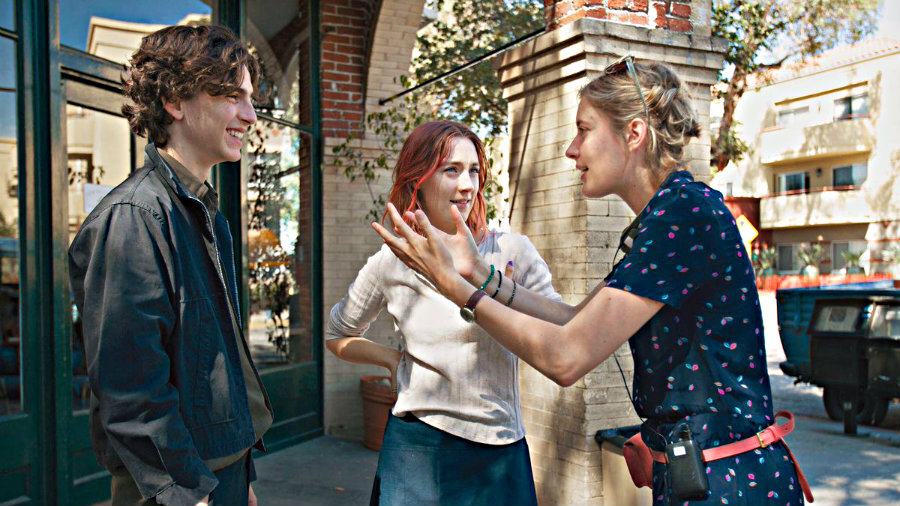 on set directing Timothée and Saoire in Lady Bird (2017)
on set directing Timothée and Saoire in Lady Bird (2017)
I reminder her about that comment about acting for others not being her path and she says "I know..." in a goofily apologetic way, like she always knew where she was heading but just hadn't told us. Our interview is after the jump...
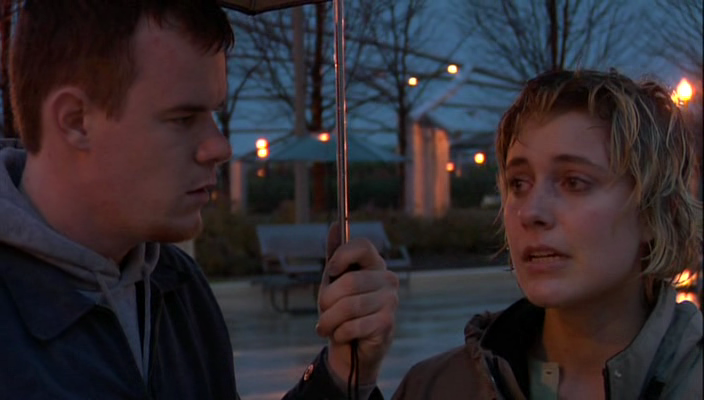 her early days experimenting in mumblecore, like Nights and Weekends (2008)
her early days experimenting in mumblecore, like Nights and Weekends (2008)
NATHANIEL: About ten years before Lady Bird, you co-directed once with Joe Swanberg. How was that experience different?
GRETA GERWIG: Well, that movie was not really written but more devised and improvised. It was tiny the way we made them. That was a wonderful tool in terms of learning how films are put together and what you need to make a movie. Lady Bird was really the culmination of working both in front of and behind the camera -- all these different roles -- and the movies I’d written alone and the movies I’d written with Noah. I went back to what I’ve always been interested in which is, in a way, language-driven cinema. It’s a bit odd because cinema isn’t primarily a medium of words. But words are what I love. Writing the script took a long time as all my scripts take a long time because —because they just do.I have to really sit in a mess for a while to figure it out.
When I was in preproduction and then shooting it and then editing it, it really felt like ‘this is what I always wanted to do’. I got to draw on all the experience that I had and the work that I’d done in learning to make movies. All of that kicked in, which was tremendously satisfying and what I had hoped would happen! But the truth is you never know until you’re there.
My favorite movie last year was 20th Century Women. It had all these little scenes with this big ensemble telling you so much about the characters. Not unlike Lady Bird! I assume, given the projects you've worked on, you’re looking for kindred spirits?
Definitely. Working with Mills was one of the great joys of my acting career. He’s such a collaborative sensitive director while still maintaining exactly what he wants. You feel like you’re in steady hands but he’s always looking for you to bring your whole self to it. I loved the way he ran his set and how he constructed the movie. I stayed friends with him because we are kindred spirits and also his wife Miranda July is one of my favorite artists. Between the two of them, It’s a very inspiring household!
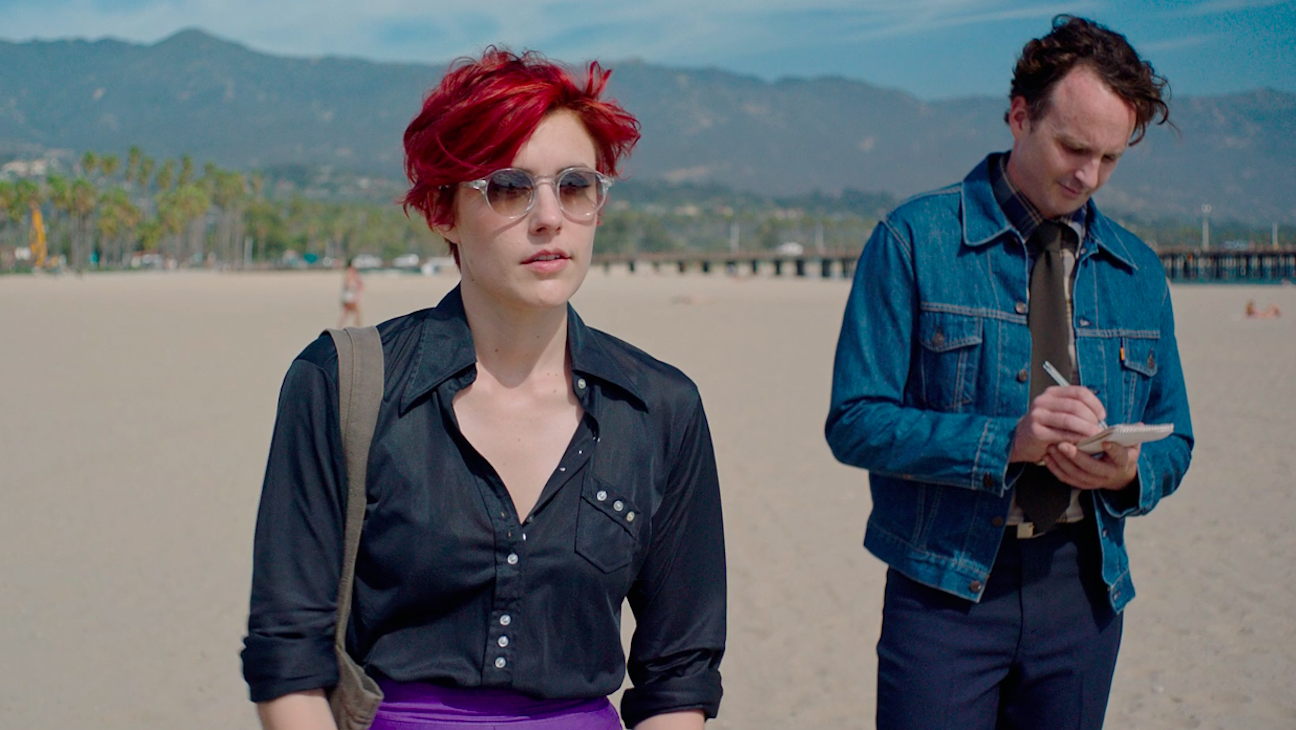
GRETA: I had him read the script of Lady Bird and we talked many times what he does in production. I talked to a lot of my filmmaker friends. Everyone was so generous with me, directly, with what they knew. I’d absorbed a lot by just being around it but being able to ask very clear questions of people was invaluable and Mike was a huge part of that.
NATHANIEL: I have to ask about the Sondheim obsession in the movie. I laughed so hard at the punchline with Stephen McKinley Henderson after the performance.
GRETA: Of course!
"They didn’t understand it." Such a perfect joke.
[Delighted] I know, I know.
Were you juggling different musicals as ideas while writing?
NO! It was always "Merrily...". First of all, it’s probably my favorite musical. It makes me cry, even just the opening chords. And it has the central ache of time moving away from you faster than you can hold on it. That was a quality I wanted in the film which is that it felt that it was tumbling forward. There’s a relentless ticking clock. Whether you solve this problem or not, time’s going, childhood is done.
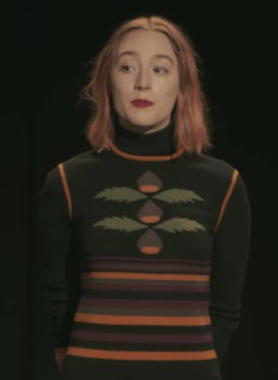
That feeling, which he writes so eloquently, yesterday is gone. That felt like it mirrored something to me about the film. And then I also thought it would be sad and strange to have a high school perform it.
Right!
It seems like far too depressing show to have a high school. Since then I’ve talked to a lot of people who id perform it in high school which I can’t even believe.
Well they did have that very young cast when they first debuted it.
That’s true. So "Merrily" was written in and it was really just a document sitting on my computer. When Scott Rudin came on he said “call up Stephen and we’ll figure this out.' I wrote Sondheim a letter and he agreed to it. I was so thrilled.
Have you met him?
I’ve never met him still!
I’m dying to know what he thinks of Lady Bird.
Me too. I still have my fingers crossed about it. The audition songs “Being alive” is pretty great and I thought “Everybody Say Don’t” was a perfect song for Saoirse’s character — but I’m a big musical theater nerd IF YOU CAN’T TELL !
[Both laugh]
One thing that’s interesting to me about the movie is your use of older actors in really key moments. Like Lois Smith...
She's so wonderful.
Stephen McKinley Henderson. They have to give a whole character so quickly, but they're all so great in it.
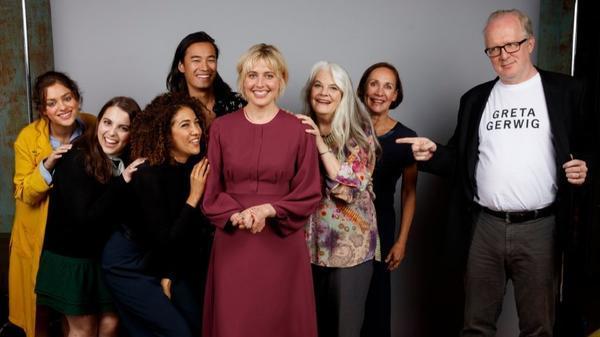
It is a big ensemble and every character counts and gets a moment. I spent a lot of time working on that at the script level. My initial script was 350 pages long because I really want to get to know the characters. Even if we only see them for a few scenes, I want to be able to speak of them as whole people. We got some rehearsal time but I think the truth is all of the actors — Lois and Stephen are some of my favorite actors -- but also Marielle Scott who plays Shelly or Jordan Rodrigues who plays Miguel, they’re all so talented. This is what extraordinary actors do: they bring a whole life to something with a minimum amount of real estate.
So. I have to ask: How come you’re not onscreen?
Um. I don’t have any interest in directing myself. Writing and directing is my favorite thing I’ve ever done. I love it so much. Watching actors saying things I’ve written is such an incredible pleasure.
[Whispers] Ohmygod, please don't tell me you’re retiring from acting.
[Laughter] No, I’m going to keep acting. But I don’t know how it is that people direct themselves?! As an actor I need to forget that the camera is there. There are different kinds of actors. Some actors can be very aware of the camera, they can have an outside eye on their performance while it’s happening. I’m not that kind of actor. Directing myself I think I’d lose my mind.
But I love acting for other people! Getting to sink into their world and other characters -- but, yeah, I don’t think I’m ever going to direct myself.
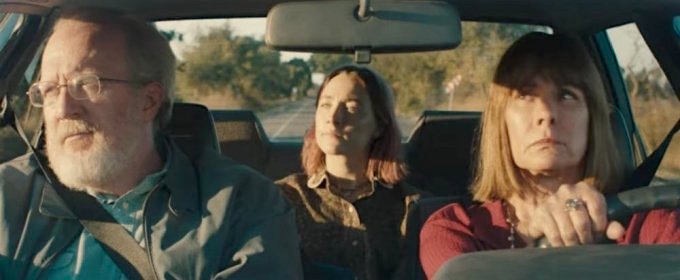
NATHANIEL: Okay I have a minor quibble. You talk about language-driven cinema but I'd argue that Lady Bird is actually quite visual in its storytelling. Do you see images while you're writing or do you think I’ll let the cinematography figure this part out.
GRETA GERWIG: I do see images! My favorite filmmaker of all time is Howard Hawks. He’s both an incredibly visual filmmaker and a language driven filmmaker. One of the central images of the movie that I saw early was when she's dropped off at the airport. You have this intuitive sense that you should stay with the daughter. But then you stay with the mother.
That image of the daughter fading in the background and the camera staying with the mother — that was a formative image in shaping the movie.
That scene. Ahhh [grabs heart]
The cinematographer, Sam Levy and I, we’d work together on Frances Ha and Mistress America. He’s an incredible cinematographer and he’s deeply collaborative but a total artist. Because we knew each other from before we spent hours and hours and hours together. Not just in preproduction but before because we both live in New York. We looked at movies and paintings and photographs. We would shot list and storyboard -- I think we storyboarded the movie twice all the way through! I always had a sense of wanting the movie to feel that very — almost that you could sense a proscenium the entire time. I didn’t want anything handheld. I didn’t want anything to feel verité.
You wanted it heightened?
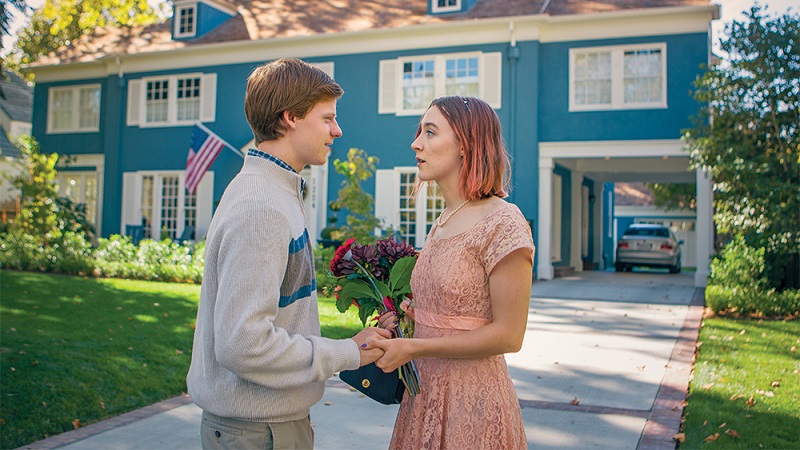
I wanted it to feel presentational. I kind of wanted the frame, especially in wide shots, to exist like stained glass windows, like it's told in static frames. As if, if you pulled out every single wide shot you could construct the story. We had a very specific palette that was I going for, a particular color and light. Early color films had a heightened painted quality which I like. I don’t want it to look just like life. I want it to be somehow painted.
I guess I’m both a language-driven filmmaker and an image-driven filmmaker. I guess I’m both. I like both! Maybe I’m just a maximalist? [Laughs]
That’s great but you’re rebelling against your roots!
[Laughter] I know. I am! Everything is so scripted and placed. It’s the opposite of what it was to begin with! That’s the wonderful thing about growing in a medium. You get to move through phases. We’re too much in a hurry for people to settle on their style.




Reader Comments (12)
Wow. It's always such a joy when you interview, Nathaniel. I've been reading and watching basically all of Greta's Lady Bird interviews and you still found new questions for her to answer. She seems really engaged. Bravo!
Great interview! Her focus for both the words and the images is why Lady Bird worked so well. Can't wait to see more from her.
What a great read, such a flowing conversation. She is a delight, can't wait for what she does next as a director.
Considering that it's a rather short screenplay, I am astounded that her first draft was so long! After my friend and I saw it, we noted that it felt like every character could have their own movie.
I mean this as a compliment: "Lady Bird" is written like an exceptional situation comedy with a time limit. It's an incredibly tight, economic script.
LOL at you both gushing over being theatre lovers,almost like it's not cool but it is if you find someone who shares those great live lived in moments.
I adore her, and this only cements that. Now I have to go back and rewatch Lady Bird looking specifically for those "stained glass windows"!
OH MY GOD JUST WHEN I THINK I CAN'T LOVE HER ANYMORE THIS HAPPENS. Just by reading this I want her to act or direct a musical!
I await for whatever Greta Gerwig does next.
What a delightful interview. Great job, Nathaniel!
Lady Bird was my favorite film of 2017 and I'm so eager to see what Greta does next.
She is such a delight. Great interview, Nathaniel.
Would we all melt into puddles if she won Best Director,maybe that's our Marcia Gay Harden this year.
Will be sad when Lady Bird goes home empty handed on Sunday but I am heartened that 40 years from now people will still be watching and enjoying this film.